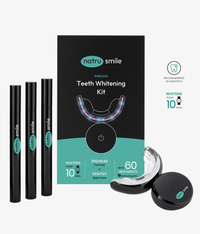
All products are certified by dental expert Dr. Greg Grillo
Why Do I Have To Take Precautions After Teeth Whitening?
When you have your teeth whitened, whether with a professional procedure or teeth whitening products, the whitening solution strips away the outer layer of your teeth. The process leaves your enamel more vulnerable to damage because it can strip away some of the protective layers of enamel.
When the whitening solution is applied to your teeth, it breaks apart the molecules in your enamel. The process exposes softer parts of your teeth and makes them more susceptible to acid erosion. More acidic foods like eggs can then wear away at these sensitive areas, causing damage over time. So, to prevent this from happening, you’ll want to take extra care when choosing food to eat after whitening procedures.
Is It Recommended To Eat Eggs After Teeth Whitening?
Eggs are a nutritious food that can be beneficial to oral health, but when it comes to eating them after teeth whitening, there are some potential risks. As mentioned, bleaching agents used in many teeth-whitening procedures can weaken enamel and make teeth more sensitive to acidic foods. While eggs aren’t the worst food to eat after whitening your teeth, consuming too much of it could potentially damage your freshly whitened teeth.
Many don't know that eggs are actually slightly more on the acidic side of the scale. Scientifically, eggs have a moderate acidity pH of 6.1 to 7.96. But what is it about its constituents that makes it this way?
The yolk is considered the more acidic part of the egg, while the egg white is naturally alkaline - even increase in alkalinity as the egg gets older. This is why many professionals recommend sticking to egg whites and avoiding eating the yolk after whitening.
Generally, it’s recommended that you wait at least 48 hours after whitening your teeth to eat eggs. Doing this gives the enamel time to recover and reduces the risk of damage.
Tips For Eating Eggs After Teeth Whitening
If you’re going to eat eggs after a teeth-whitening procedure, there are a few tips you should follow to protect your smile.
Make sure that you’re brushing and flossing regularly to remove food particles from between your teeth.
Use a teeth whitening toothpaste specifically designed for sensitive teeth, as this can help reduce the risk of damage from acidic foods.
Rinse your mouth with water or even better, a teeth whitening mouthwash after eating eggs or any other acidic food. This will help neutralize the acid and prevent it from damaging your teeth.
You can even consider using a teeth whitening powder or gel after eating foods that are prone to damaging your teeth to touch up your smile.
The Effects Of Acidic Foods On Teeth
Acidic foods and drinks can erode tooth enamel, making teeth more sensitive, prone to discoloration, and prone to cavities over time. To reduce the risk of damage, it’s best to limit your consumption of acidic foods and drinks, particularly after a teeth-whitening procedure. Some examples of acidic foods include citrus fruits like oranges, lemons, grapefruits, tomatoes, vinegar-based dressings and sauces. Additionally, many carbonated beverages contain acids that can erode enamel.
While eating eggs is generally safe after teeth whitening, you should still monitor your consumption of other acidic foods and drinks. Doing so will ensure you don’t inadvertently damage your teeth after whitening your teeth.
Let’s dig a little deeper into the relationship between eggs and teeth.
Are Eggs Good For Teeth And Gums?
Eggs can be beneficial for the health of your teeth and gums. They’re high in protein, which helps to strengthen tooth enamel and reduce the risk of decay.
Additionally, eggs contain calcium and phosphorus, both of which are important minerals for maintaining strong and healthy teeth. Not to mention the essential vitamins like A and D that can help keep gums healthy.
Are Eggs Good For Tooth Decay?
As previously mentioned, eggs are high in protein and contain essential vitamins like A and D that help maintain strong teeth. Its phosphorus content also helps to remineralize teeth and prevent decay.
Do Eggs Cause Yellow Teeth?
Although their yellow color can seem threatening, eggs won’t likely be the cause of yellow teeth. Tooth discoloration is caused by a number of factors, including poor dental hygiene, genetics, smoking, and certain medications. Eating eggs won’t cause yellow teeth unless the egg yolk is allowed to sit on the teeth for extended periods of time.
Can Eggshells Damage Teeth?
There’s potential that eggshells can damage teeth. Eggshells are made up of calcium carbonate, which is an abrasive material that can wear down the enamel on your teeth if you’re not careful.
Do Eggshells Contain Fluoride?
No, eggshells do not contain fluoride. Fluoride is a mineral that helps to strengthen tooth enamel and prevent decay. It's typically found in toothpaste, mouthwashes, and certain types of drinking water.
Can Eggs Stain Your Tooth Enamel?
Egg yolks contain a yellow pigment called xanthophyll that gives it its natural color. Although the staining effect, if it were to happen, is usually temporary, it’s a good idea to rinse your mouth with water or mouthwash after eating eggs or any other acidic food to help reduce the risk of staining.
Wrapping Up
Eating eggs after a teeth-whitening procedure is generally safe, but it’s always recommended to take precautions. To protect your newly whitened teeth, be sure to brush and floss regularly and visit your dentist for regular checkups.
Following these tips will help protect the health of your smile while still allowing you to enjoy the nutritional benefits of eggs!











